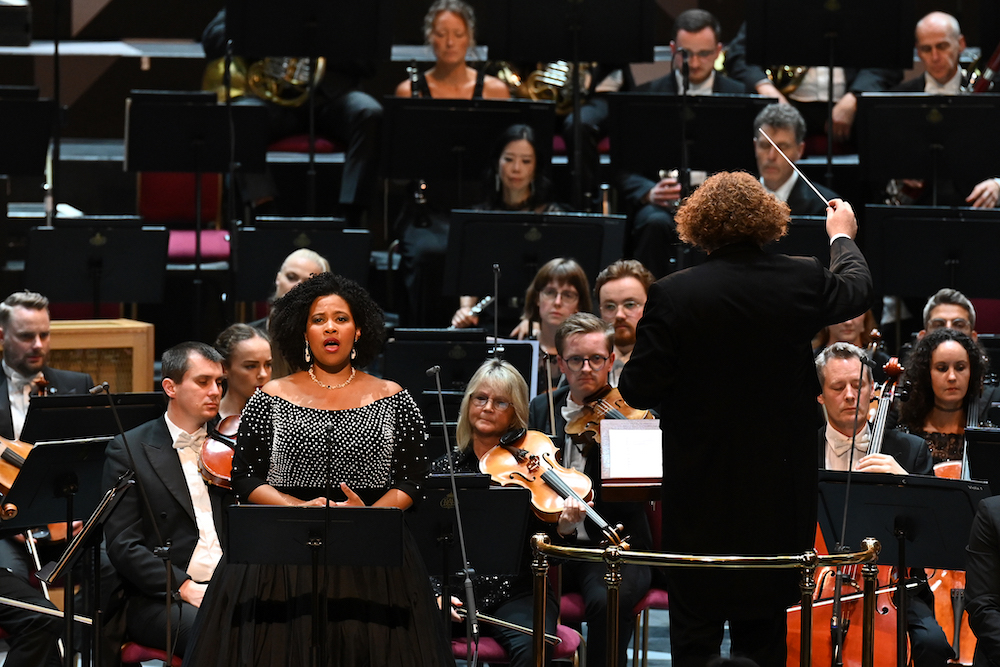Performances of varying quality, but much to enjoy in a couple of premieres and some exhilarating Ravel.
Music of solace and sensuality formed the twin peaks of this all-French programme with works by two equally fastidious composers and a pair of works by a young woman whose untimely death at the age of 24 would cut short her unfulfilled potential and a highly promising career. In recent years the works of Lili Boulanger have steadily earned their place in the concert hall and her two seldom-heard offerings here made clear her remarkable gifts. In just a handful of years between 1911 and 1918 she wrote music of immense visionary power, exhibiting a technical assurance and expressive range redolent of both Fauré (her teacher) and Ravel. In this concert her strong religious impulse was illustrated in her settings of Pie Jesu (1918) and Vieille prière bouddhique (completed 1917), both receiving their Proms premieres.
They were given exceptional performances, with South African soprano Golda Schultz positively glowing in the earnest pleas of Pie Jesu, a haunting lullaby dictated to Lili’s sister Nadia from the confines of her deathbed. Its soaring vocal line over disquieting chromaticisms was perfectly captured by Schultz and the BBC Symphony Orchestra, the knowledge of eternal rest subtly poised more as a question than an absolute. The orchestra was later joined by tenor Laurence Kilsby and the BBC Symphony Chorus for Vieille prière bouddhique, an atmospheric setting of an ancient Buddhist prayer. Its unison choral petitions, whole tone solo lines and gentle flute arabesques gave further evidence of Boulanger’s range of expression, not least a certain exotic sensibility, in a persuasive outing.
It formed an ideal centre piece to two evocative works: Fauré’s incidental music to Maeterlinck’s Symbolist play Pelléas et Mélisande and Ravel’s sumptuous Daphnis et Chloé: Suite No. 2. Just the right sense of wistfulness was summoned for the ‘Prélude’ of the Fauré, with the gently simmering activity of ‘La fileuse’ neatly outlined. Unaffected poise shaped the ‘Sicilienne’ (flute and harp exquisite), while ‘La mort de Mélisande’ was rendered with a pensive fatalism.
Ravel’s ‘choreographic symphony’, as he called his 1912 ballet score, could have been written for the Royal Albert Hall, so perfectly does it suit the building. It was a particular joy to hear this version with chorus, sung here with considerable fervour, as if each of the singers was determined to rescue the abducted shepherdess Chloé. Its traversal from shimmering dawn to an unbuttoned celebration of pagan love was the evening’s highlight – chorus and orchestra on blistering form.
Earlier, choir and reduced orchestral forces, with Richard Pearce on the organ, gave a very singular performance of Fauré’s Requiem. French conductor Stéphane Denève underlined the work’s intimacy and gravitas with a spacious tempo that leaned heavily towards austerity rather than comfort. Oddly, the whole felt considerably slower from my stalls seat than the radio encounter I heard the following day when dynamics were more varied and the organ less intrusive. It’s such a familiar work with choirs that I was surprised to hear one or two nervous entries and some unvarnished singing, as if Denève had asked for a blanched, disembodied tone with little warmth or expression. That said, there were some fine moments with the sopranos bringing finesse to the ‘Sanctus’ (orchestral horns dominating here) and the ‘In Paradisum’, where phrases were beautifully etched, and the reassuring vision of the afterlife finally glimpsed. Not knowing which edition was being used, I was startled to hear the sopranos lengthen their single note on ‘Lux’ (‘Agnus Dei’). Nonetheless, it was an arresting moment and a memorably starlit bar.

The performance was considerably enhanced by Golda Schultz whose rapt tones were lavished on the ‘Pie Jesu’, her singing a model of refinement. Impressive too was Jacques Imbrailo’s noble baritone in his pleas for deliverance from eternal death, and the movement’s accumulating tensions were well caught. Overall, it was an uneven rendition, its extended pauses between movements adding to an overall sluggish effect. Listening to the radio broadcast is highly recommended.
David Truslove
Lili Boulanger – Pie Jesu; Gabriel Fauré – Requiem; Fauré – Pelleas and Melisande, Op. 80: Suite; Lili Boulanger -Vieille prière bouddhique; Maurice Ravel – Daphnis and Chloé: Suite No. 2.Golda Schultz – soprano; Laurence Kilsby – tenor; Jacques Imbrailo – baritone; BBC Symphony Chorus, BBC Symphony Orchestra, Stéphane Denève –conductorRoyal Albert Hall, London, 4 September 2024
Photos: BBC/Chris Christodoulou